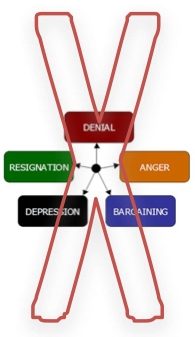So, it turns out that “stages” theories, particularly Elisabeth Kubler-Ross’s well-known five stages of grief, have no basis in research, according to Michael Shermer in Scientific American.
We humans apparently come up with these stages because, Shermer writes, “we are pattern-seeking, storytelling primates trying to make sense of an often chaotic and unpredictable world.”
Kubler-Ross’s grief stages aren’t the only ones to come under question; also on the line of fire are Freud’s five stages of psychosexual development, Erik H. Erikson’s similar eight stages, and Lawrence Kohlberg’s stages of moral development.
Shermer quotes social psychologist Carol Tavris:
“In developmental psychology, the notion of predictable life stages is toast. Those stage theories reflected a time when most people marched through life predictably: marrying at an early age; then having children when young; then work, work, work; then maybe a midlife crisis; then retirement; then death. Those ‘passages’ theories evaporated with changing social and economic conditions that blew the predictability of our lives to hell.”
Second, Tavris continued, “is the guilt and pressure the theories impose on people who are not feeling what they think they should. This is why consumers of any kind of psychotherapy or post-traumatic intervention that promulgates the notion of ‘inevitable’ stages should be skeptical and cautious.”
Shermer concludes by saying: “Stages are stories that may be true for the storyteller, but that does not make them valid for the narrative known as science.”
So, stages apparently exist only in the mind of the people living them. No reason we can’t all document our own stage stories. From a psychological standpoint, how would you characterize the stages of development, moral growth, or grief you’ve experienced?
